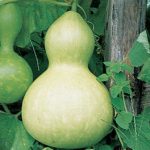 A fleshy many-seeded fruit of one carpel with parietal placenta (as in Cucurbitaceae).
A fleshy many-seeded fruit of one carpel with parietal placenta (as in Cucurbitaceae).
Although many people still pronounce gourd so that it rhymes with moored or steward, it is becoming more common to hear it pronounced so that it rhymes with sword. This shift in pronunciation is, naturally, a source of consternation for men who are named Cord, but they may take heart in knowing that their name is in no way related to that of the head-shaped, hard-shelled fruit (although the gourd is eaten like a vegetable, it really is a fruit). The ancient Romans called the gourd cucurbita, a word that the French mangled badly when they adopted it and turned it into their word gourde. English then borrowed the French term in the early fourteenth century, first using it as a name for the fruit, and later, from the seventeenth century onward, also using it as the name of a water bottle or cup made from a gourd or even from some other material. The original Latin term, cucurbita, was also adopted by English as early as the fourteenth century, when it was used as the name of a vessel employed by alchemists to distill liquids. In contrast with the Latin ancestry of gourd, the personal name Gord—or rather its full form, Gordon—derives from a Welsh source: gor, meaning large, and din, meaning fort. The Gaelic equivalent of the Welsh din is dun, a word found in the names of many Scottish cities, such as Dundee and Dunbar, that originated as forts.
Herbaceous plant bearing fruits of several different shapes all having a woody texture.
In the United States, the term “gourd” refers to several vines belonging to the Cucurbitaceae family, which includes related plants such as pumpkins, cucumbers, and squashes. The shells of these gourds are dried and used as utensils or for decorative purposes. In Europe, the name “gourd” is applied to both edible and inedible members of the family.
